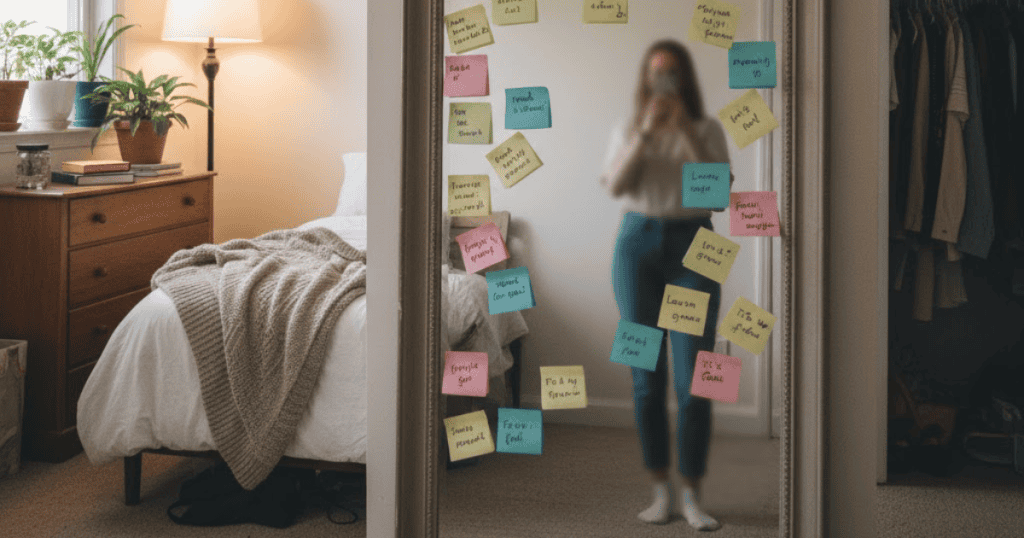Imagine how different our healing journeys would look if narcissists could be honest for just five minutes.
Five minutes of truth instead of manipulation.
Five minutes where they dropped the performance and told us what we always suspected but never heard out loud.
I used to fantasize about that moment, especially during the years I spent trying to decode the emotional chaos inside my own home.
Growing up, the lies were constant but never obvious.
My mother would say one thing in the morning and deny it by afternoon.
My older sister mastered emotional theatrics so well that even I questioned my own reality.
My younger brother could hurt me and somehow twist the story until I’d end up apologizing.
And there I was, craving one honest explanation.
Something that would make the confusion make sense, something that would stop me from blaming myself for the dysfunction that I didn’t create.
But narcissists will never give you closure.
Their silence, their denial, and their rewriting of history are the manipulation.
So instead, here’s what they would confess if honesty didn’t threaten the empire they built.
And hearing these truths, even hypothetically, might be what finally saves your sanity.
Table of Contents
11 Things Narcissists Would Admit If They Were Ever Honest

1. “I Don’t Care What You Think”
Their cruelty isn’t accidental. Your feelings simply don’t register as important to them.
I realized this the morning that my narcissistic mother criticized the way I folded towels.
I had spent the whole morning cleaning the house while she slept in.
When she finally came downstairs, she glanced at the neatly folded stack and said, “You’re doing it wrong.”
No thank you. No acknowledgment. Just the immediate correction, as if I existed solely to serve and still failed.
I used to believe that if I explained myself better or softened my tone, maybe she’d understand me.
But narcissists don’t suddenly gain empathy because you communicate perfectly.
They mimic empathy when it benefits them, when it keeps you compliant.
The pain of accepting this truth is sharp at first. But eventually, it becomes freeing, because you stop expecting water from a stone.
2. “I Act Superior Because I Hate Myself”
Their arrogance is a camouflage. Underneath it is a bottomless pit of self-loathing.
My toxic sister walked around our childhood home like she owned all the oxygen in the building.
She belittled every achievement I had, mocked my grades, rolled her eyes at my hobbies, and dismissed my goals as “unrealistic.”
For years, I assumed she genuinely believed she was better than me.
But superiority is always a disguise.
Narcissists tear others down to temporarily escape their own inner hatred.
The more fragile they feel, the harsher they become.
The irony? They destroy others in an effort to avoid facing the shame they’ve been running from their whole lives.
3. “I’m Insecure”

Their confidence is a costume, held together by your attention.
My controlling brother was the golden child. Loud, bold, always surrounded by people who fed into his charm.
But I’ll never forget the afternoon I found him raging in his room because a friend forgot to text back.
His meltdown wasn’t about the message. It was about the threat to his fragile ego.
Everything he projected, his dominance, charisma, and bravado, was constructed to hide how easily he shattered.
A narcissist’s insecurity is not your responsibility to fix.
Not then. Not now. Not ever.
4. “I Don’t Love You”
Narcissists don’t love you.
They use you, depend on you, and own you, but they don’t love you.
What they call love is conditional access.
I learned this from my toxic mom long before I even understood the concept.
When I obeyed, she “loved” me. When I questioned, she iced me out for days. When I set a boundary, she turned cold and distant.
Love requires empathy. It requires respect and seeing someone as separate from your own needs.
A narcissist is incapable of that.
You are loved only to the extent that you are useful.
5. “I’m Using You”
Every relationship with a narcissist is transactional.
My aunt, another narcissistic family member, was an expert at this.
She’d call me only when she needed something: a ride, help with paperwork, someone to play “peacemaker” after she created unnecessary drama.
Whenever I needed emotional support, she was suddenly too busy, too tired, or too annoyed.
Narcissists treat people like emotional batteries.
They take your energy, your time, sanity and give nothing but manipulation in return.
Ask yourself honestly: What role were you forced into?
The fixer?
The peacekeeper?
The emotional sponge?
Now ask yourself something even more powerful: Is that role still yours to play?
6. “I Love Seeing You Miserable”

Your pain reassures them that they still have control.
I learned this in the cramped hallway of our old home.
My manipulative sister had said something vicious, something that cut deeper than she expected, and I went silent.
Not crying. Just quiet.
And in that quiet, I watched her eyes light up in satisfaction.
To a narcissist, your misery is proof that their emotional dominance still works.
Your sadness mirrors the narcissist’s internal chaos, and it’s the only feeling they truly recognize.
This is why one of the greatest acts of self-protection is to stop explaining or showing your pain in front of them.
Indifference is their greatest loss.
7. “I Want Everyone to Think I’m a Good Person”
Public saint, private sinner. That’s their specialty.
My narcissistic parent perfected this.
At my brother’s school events, my mom would glide through the crowd like the model parent.
She would smile, compliment teachers, and offer help she never actually intended to give.
People adored her. They’d tell me how “lucky” I was to have such a kind, involved mother.
Meanwhile, at home, she could freeze the entire hallway with one look.
One wrong word from me and she’d dismantle my confidence.
Narcissists build reputations with surgical precision.
They curate an image so flawless that outsiders automatically dismiss your experiences. That disbelief is part of the manipulation.
But here’s what narcissistic abuse survivors often forget: That façade eventually cracks.
Not when you desperately need it to, but inevitably.
Because truth has a way of crawling out of even the tightest, most polished mask.
8. “I Fake Illness or Drama for Attention”
Feigned vulnerability is one of their most effective traps.
My self-absorbed brother used to suddenly “feel sick” every time I achieved something.
If I won an award, he’d develop mysterious symptoms. If my dad praised me, he’d start hyperventilating from “stress.”
Every spotlight on me felt like an emergency for him.
And if I pulled back?
Guilt. Accusations. “Why aren’t you helping? Can’t you see I’m suffering?”
It’s manipulation disguised as fragility.
It’s not compassion you’re exhausted from. It’s the emotional circus they create to keep you orbiting them.
9. “I Hate Special Occasions”

Birthdays. Holidays. Milestones. Big events.
Anything that’s not about them is a threat.
The clearest memory I have of this is my birthday. My cousins from my mother’s younger brother came over to surprise me.
I was excited, genuinely happy.
My jealous sister watched the whole moment unfold from the top of the stairs with a look of pure resentment.
Later that night, she picked a fight with me over something insignificant, completely ruining the day.
They sabotage joy because joy that isn’t centered on them feels like betrayal.
One of the biggest signs of narcissistic abuse recovery is when you celebrate without them and feel finally at peace.
10. “I Hate Being Alone”
Solitude forces them to face the emptiness inside.
My mother could never sit in silence. She’d blast the TV, pick fights, call relatives, or create drama just to fill the void.
If no one was available to feed her ego, she’d come after me or my toxic siblings.
Not because she needed company, but because she needed a distraction.
Your absence doesn’t make them lonely. It makes them lose control.
Those aren’t the same thing.
11. “I Don’t Have Real Friends”
Narcissists don’t maintain authentic friendships, only admirers and assets.
My aunt used to brag about having “so many friends.” But every time she called them, she talked at them, not with them.
She’d complain, demand favors, then disappear for months.
The one time she needed actual support, not a single person showed up.
Charm wins attention, but never loyalty.
Real relationships require vulnerability, and authenticity terrifies them.
The Brutal Honesty You’ll Never Hear From Them

Narcissists depend on illusion.
Honesty would destroy their entire system of control.
Their silence keeps you doubting yourself. Their denial keeps you apologizing. Their rewritten memories keep you trapped.
But the moment you understand the truth behind their narcissistic behaviors, something shifts.
You stop craving explanations from people who deliberately withhold them.
These confessions are not fantasies. They are reminders, psychological truths survivors must internalize to stay free.
You don’t need their honesty to heal. You just need to stop believing their lies.
What Happens When You Accept the Truth

The day you finally accept who they really are, not who you wish they could be, something inside you unclenches.
It’s not loud. It’s not dramatic. It’s a quiet exhale, almost imperceptible, but life-changing.
You stop waiting for closure from someone who benefits from keeping you confused.
You stop replaying old conversations, hoping to make them make sense.
You stop twisting yourself into knots to earn decency from someone who never intended to offer it.
Believing these unspoken truths helps you detach emotionally, strategically, and intelligently.
It gives you the distance you need to rebuild yourself, your identity, confidence, and peace.
Understanding them is liberation.
Because the moment you stop expecting them to be who they are not, you regain power they never wanted you to have.
When you start hearing the truths they’ll never say, that’s when you finally stop needing their voice at all.
Related posts:
- 8 Things You’re Not Responsible for When Dealing with a Narcissist
- 6 Things That Happen in a Narcissist’s Brain During Rage (And Why It’s So Dangerous)
- Narcissists Unravel Fast When You Quit Apologizing For These 10 Things
- 13 Unsettling Bedtime Habits of Narcissists (You’ll Never See “Goodnight” the Same Way Again)
- Narcissists Hate When People Do These 6 Things: Which Is Exactly Why I Do Them


